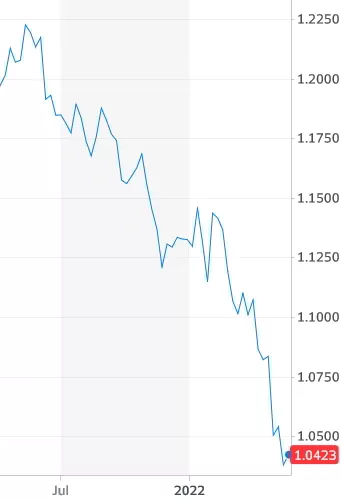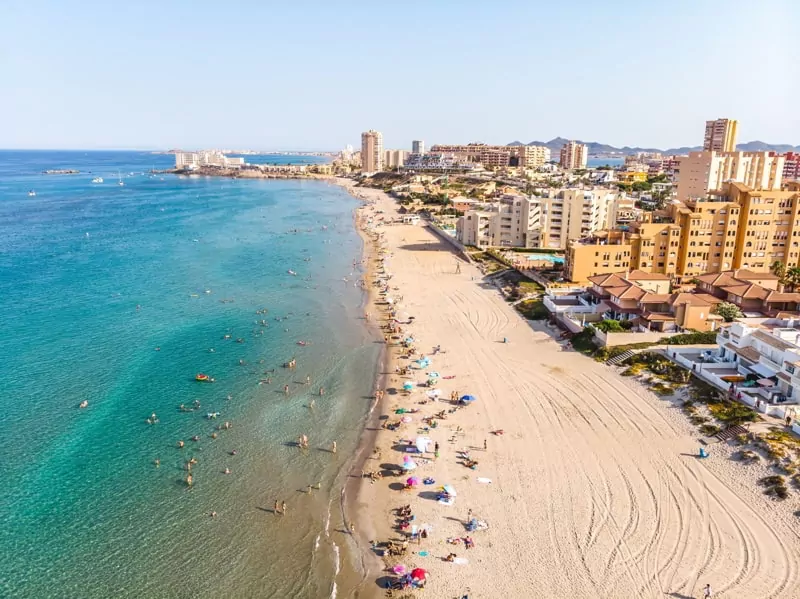Get A 14.75% Discount On All European Property Today
Take a look at this chart.

Last May the euro was worth US$1.22. Today it’s all the way down to US$1.04.
European property is now 14.75% cheaper than it was a year ago for U.S. investors.
In fact, the euro is about as weak as it has been at any time since December 2002.
It’s at a 20-year low.
This is great news for U.S. investors… A significant “dollar discount” is available to you right now.
This refers to the lower prices that U.S. investors pay in a foreign currency due to the strength of the dollar.
Novice investors are wary of investing in a country or region when they think the economy is struggling. The current weakness of the euro isn’t something to be worried about.
The exchange rates of the two largest currencies in the world vary for many reasons. The EU is an unwieldy governance structure full of the bureaucratic inefficiencies…
However, Europe’s continued investment in technology, education, and infrastructure gives me confidence in its economic viability in the long run. Europe will find alternative energy supplies by early 2023, and normalcy will return to the exchange rate.
It just so happens that right now, it’s the dollar’s time to shine. This is the moment to snap up properties that are sold in euros to avail of this dollar discount.
The euro has just about reached the bottom of its crash. It might lose a few more cents before it bottoms out and starts to regain its strength over the coming 6 to 12 months.
When it recovers in value, you’ll get to double down on your gains by adding the foreign exchange gains to any capital appreciation that your property experiences… All while earning rental income in a risk diversified investment.
Benefits Of A Weak Euro For U.S. Dollar Investors
A weak euro is great for buyers spending U.S. dollars.
An American investor who bought a house in Portugal that cost 100,000 euros a year ago would have spent US$122,000. Today, the exact same 100,000-euro investment would cost them US$104,000.
The overall cost of living in Europe has also gone down for U.S. dollar holders. The costs of travel, property inspection tours, and renovation are reduced.
A strong dollar also encourages American tourists to come and rent out your overseas property.
Drawbacks Of A Weak Euro To Foreign Investors
A weak euro is bad for investors who want to sell their eurozone property and convert the proceeds back into U.S. dollars.
This is not the optimal time to sell European property and buy property sold in U.S. dollars, as you’ll lose up to 15% on the current exchange rate.
Your rental income is now less when converted into U.S. dollars. If you are relying on your European investment to pay U.S.-dollar expenses, this affects your cash flow.
Factors To Consider When Buying Property Abroad
- How stable is the currency of the country? Historically, the euro has been relatively stable.
- Are you buying for quick capital appreciation or a long-term hold? I am confident the euro will recover in the next 12 months, and good long-term investments are currently available.
- Can you use your foreign real estate investments to hedge against political risks?
- Does this investment offer visa options, high returns, or long-term capital gains?
- Is the weak local currency driving up local property prices in the foreign real estate market? This can happen due to increased demand from foreign buyers with stronger buying power.
Foreign Currency Rental Income And Hedging
A local currency bank account provides a simple hedge against bad exchange rates, as you can choose not to convert your rental income to U.S. dollars when the exchange rate is not favorable.
When the dollar is strong, you can save your euros for later exchange at a better rate or spend them in that country. You can improve your property or double down and buy more property in the depressed market with your saved local currency.
The euro always commands its full buying power in Europe.
If you choose to live abroad, you find yourself somewhat insulated against the effects of currency fluctuation.
When the U.S. dollar is strong, your foreign property will fall in U.S. dollar value but your cost of living will also fall due to a strengthening U.S. dollar and vice versa.
If you bought property in euros last year you could be experiencing real estate appreciation while losing U.S. dollar value temporarily due to depreciation of the local currency.
This capital appreciation can be realized when the euro rebounds, or you can leave it safely diversified abroad if you are happy with the investment.
Currency diversification is about spreading risk.
The risk is that the value of your foreign currency can go down. The reward is that the value of your foreign currency can go up.
But the more diversified you get, the less affected you are by any one event.
Be aware of any foreign exchange controls of your host country before making an overseas investment.
How To Save Thousands On Your Foreign Real Estate Purchase
The unexperienced foreign exchange buyer often gets an unfavorable exchange rate from their local bank.
Using a reliable foreign exchange intermediary like Moneycorp can save you thousands on fees and charges when you are talking about the cost of a house.
Tax Implications Of Forex Fluctuation
- Expense write-off: Mortgage interest and maintenance expenses of your foreign investment property are tax deductible, but remember when filing that the value must be converted into U.S. dollar values on each transaction date, not the sale date. Ensure you get your full foreign tax credit allocation for any taxes paid abroad.
- Selling a foreign home: If you own a foreign home and have lived there for two of the last five years as your primary residence, you and your spouse can each avail of US$250,000 in tax-free gains.
- Forex losses: Sometimes you are forced to sell your European property when the dollar is strong. If you have to pay off a U.S.-based mortgage with the proceeds, any forex losses realized due to the U.S. dollar strengthening and an increase in the mortgage in foreign currency terms are considered personal losses and are not tax deductible. Forex gains on foreign real estate investments due to forex factors are taxable at ordinary U.S. tax rates. Always get professional tax advice.
- Fixing exchange rates in contracts: It’s common to fix the exchange rates in sales contracts when they are signed as forex changes between the signing date and closing date. This can cause significant additional costs to buyers.
Take Advantage Of These Current Investments In The Eurozone
How we look at foreign exchange trends can have a big impact on our long-term financial planning.
Diversification lowers overall risk, and diversifying into tangible assets in a non-U.S. dollar tied economy is one of the best ways to achieve this.
If you have dollars to spend, an instant 15%-dollar discount is available in Europe right now.
#1. Spain: Almond Farmland Investment

Invest 90,382 euros today for a long-term, high-yielding investment for a total projected 675,789-euro payout.
The lifespan of your investment is 45 years.
You own the land and the trees, and you get an IRR of 12.41% per year.
Almond trees reach full maturity around year 10, from which point on you can expect an annual payout of 16,709 euros…
Short-term finance options are available. Get more information on this investment here.
#2. Portugal: Beach Property On Algarve’s Coast

Own your own luxury home in Portugal’s Algarve region with two-bed units with sea views and your own garage space starting at 475,000 euros.
Your dollar discount on a 475,000-euro investment is US$70,000 less today than the dollar price of a similar-sized investment a year ago.
With savings like this on the table, it’s time to move before the euro exchange rate recovers.
Go here to find out what returns this dollar-discounted euro investment can earn you.
Con Murphy
Editor, Overseas Property Alert

